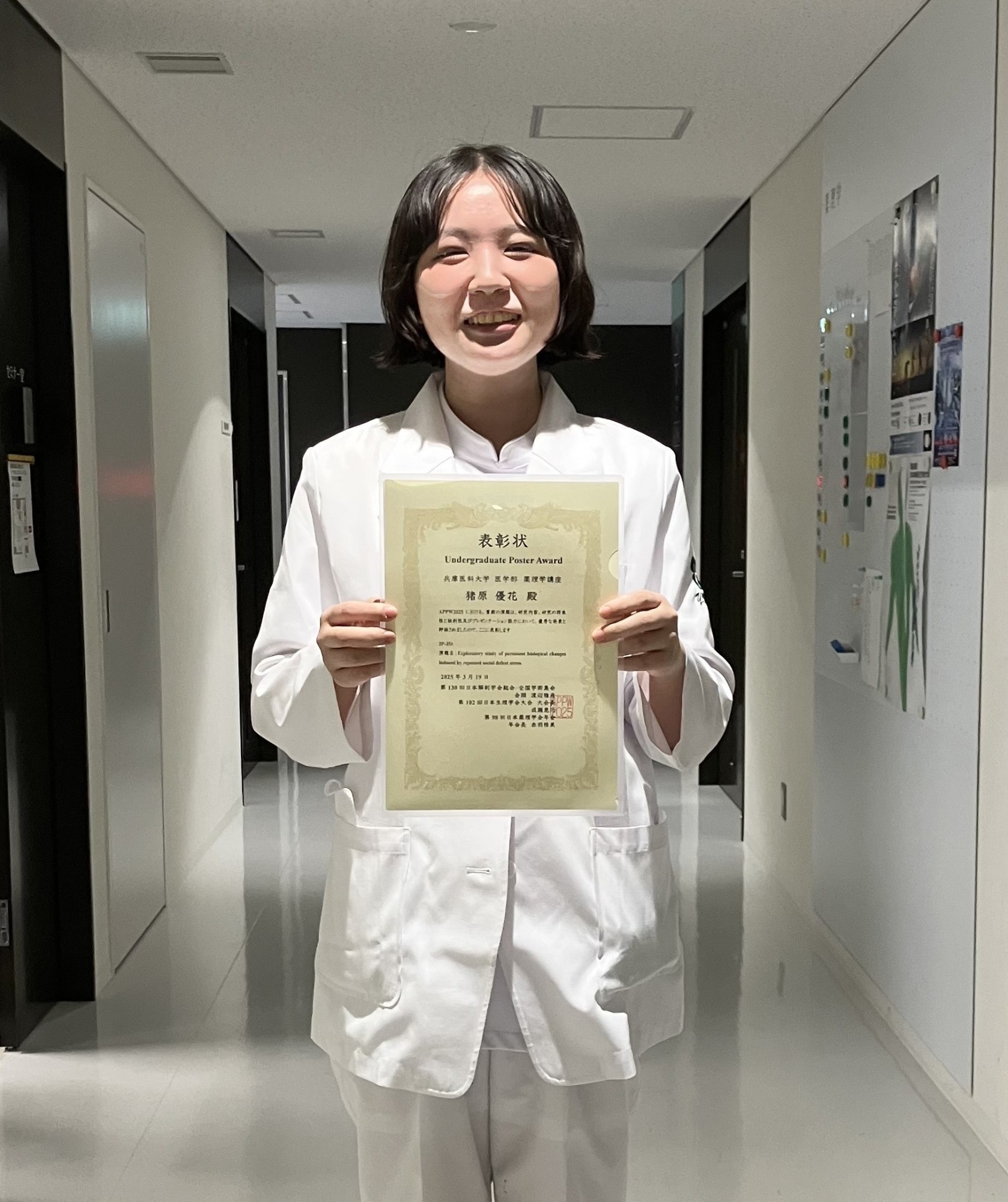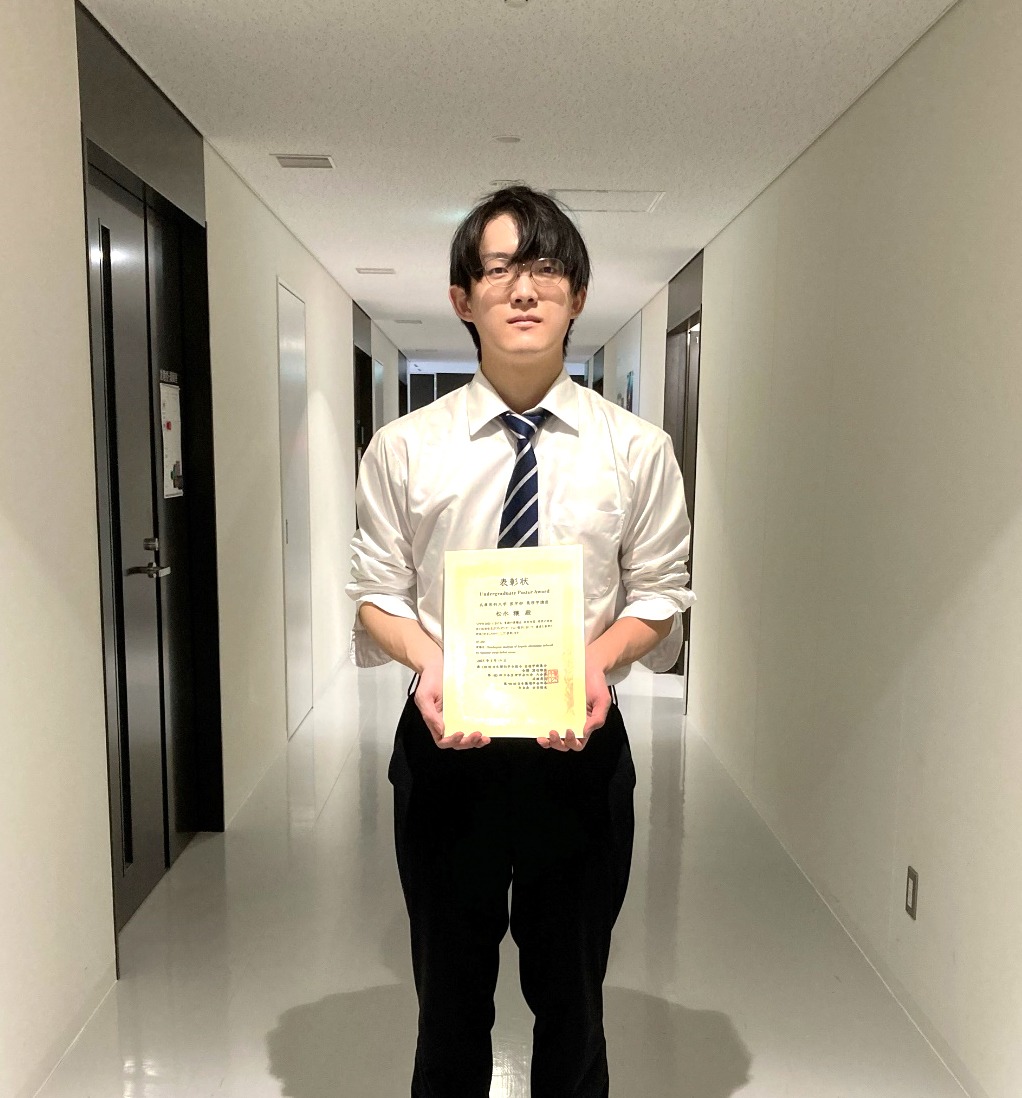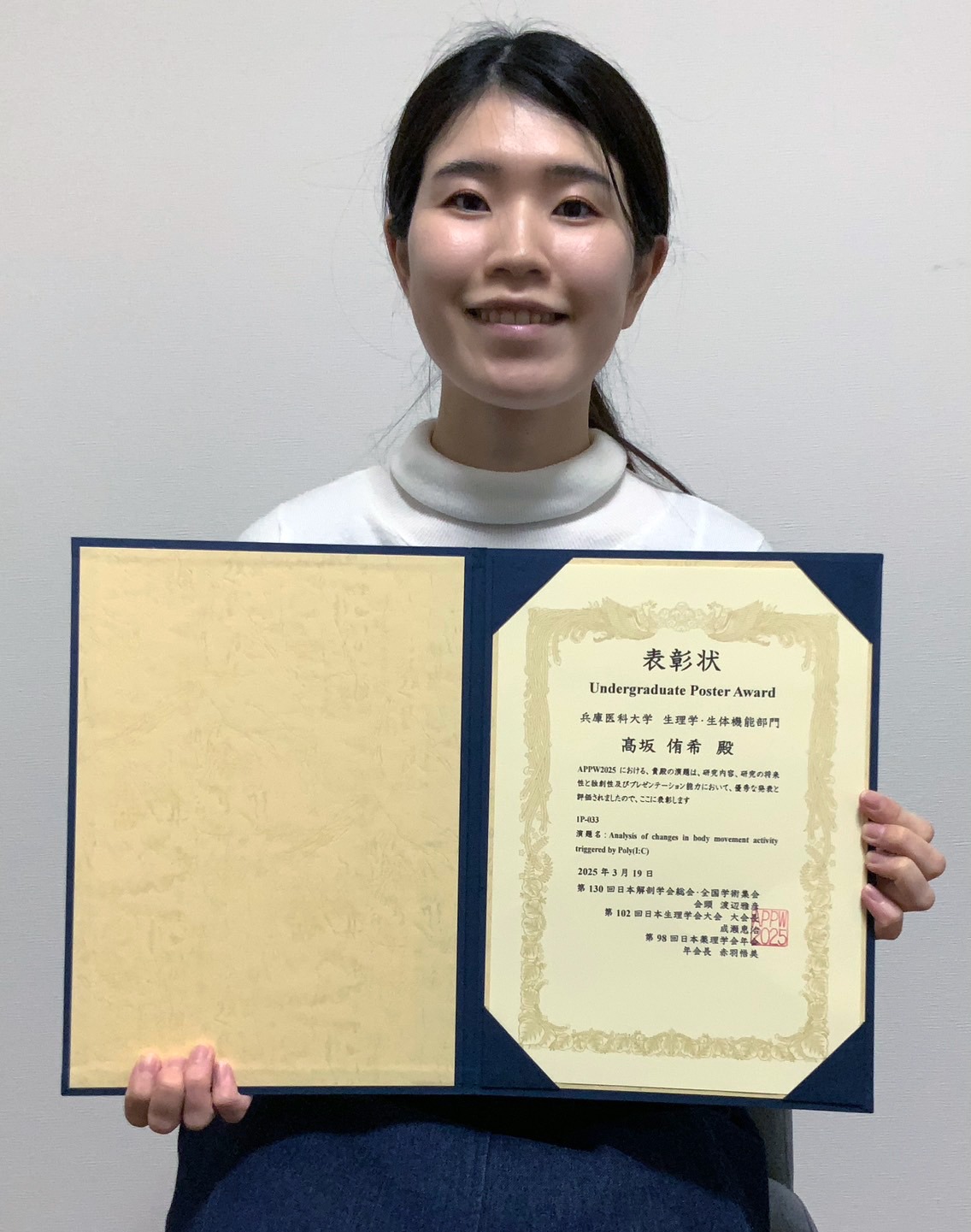Awards
Three students from the Research Doctor Course won poster presentation awards at APPW2025
Two students from our research medical course and one graduate student won the Poster Presentation Award at the poster presentation held during APPW2025 (the 130th Japanese Laboratory of Anatomy, the 102nd Japanese Physiology Society, and the 98th Department of Pharmacology Joint Conference). APPW2025 is the first large-scale conference jointly held by the Japanese Laboratory of Anatomy, the Japanese Physiology Society, and Department of Pharmacology, and was held at Makuhari Messe from March 17 to 19, 2025.
*The recipients' affiliations, academic years, etc. are as of the time of the award.
Winner: Yuka Ihara, 4th year Department of Pharmacology student

Comment from Yuka Ihara
I am very grateful to the professors in the Department of Pharmacology department who have guided me, and I am also very happy to receive this award. I am not particularly smart or intelligent, and I am not particularly good at giving presentations. However, under the enthusiastic guidance of my professors, I have been able to grow through my research and presentations. Thank you very much. I would like to use this award as motivation to continue my research.
Award-winning Abstract
Exploring persistent biological changes induced by repeated social defeat stress
Research Contents
Stress enhances depressive symptoms and anxiety, and is a risk factor for mental disorders such as depression. Repeated social defeat stress (RSDS), an animal model of depression, not only reduces social behavior but also induces a variety of biological changes in the body. Previous studies have shown that the reduction in social behavior continues for at least two weeks after the stress has stopped. Therefore, we decided to investigate biological changes that continue for more than two weeks after the stress has stopped. We created RSDS mice and performed social behavior tests immediately after the stress had stopped and two weeks later. In the first test, social behavior was significantly reduced in the RSDS group, verifying the validity of this model, and in the test conducted two weeks later, we confirmed a sustained trend of reduced social behavior in the RSDS group. Furthermore, serum analysis three weeks after the stress revealed that blood urea nitrogen levels were elevated in the RSDS group, which was strongly correlated with the reduction in social behavior.
Winner: Yutaka Matsunaga, 4th year Department of Pharmacology student

Comment from Jo Matsunaga
I am extremely honored to receive the prestigious Undergraduate Poster Award at APPW2025. I would like to express my gratitude to Professor Shiho Kitaoka, Professor Shinya Kimura, and all the other members of our laboratory who have guided my research, as well as all the faculty and staff involved in our university's research doctor course system. I will use this award as encouragement to continue to work hard in everything I do.
Award-winning Abstract
Histological analysis of liver changes induced by repeated social defeat stress
Research Contents
In order to clarify the mechanism by which chronic stress induces the onset and exacerbation of disease, our laboratory is conducting research using a repeated social defeat stress (RSDS) model in which mice are repeatedly subjected to social stress. Because RSDS reduces blood albumin and increases wet liver weight, we are working to elucidate the pathology of liver function changes caused by RSDS. Comprehensive gene expression analysis of the liver suggested infiltration of immune cells into the liver and changes in blood vessels. Therefore, we began histological analysis of the liver. Although RSDS did not cause hepatitis or fibrosis, we found neutrophil infiltration and increased blood vessel area. These results suggest that RSDS induces microinflammation and hemodynamic changes in liver tissue.
Winner: Yuki Kosaka, Graduate of the Department of Physiology and Biological Functions

Comment from Yuki Kosaka
I am very happy that the research I have been working on and found interesting has been recognized in this way. I think my research is interesting, but what makes me happiest is that other people also find it interesting. I could never have received this award on my own, and I feel that it is only possible thanks to the warm environment and support I received, including from my seniors in the Arata Laboratory. I would like to express my deep gratitude to Professor Arata, research assistant Onishi, and classmate Masutani, who guided me every day as I conducted this research. It was because of the wonderful environment that I was able to enjoy my research until the end. I am very honored to be able to conclude my undergraduate life at Hyogo Medical University of Medicine in this way. I would like to continue to cherish the fun of research and deepen my learning. Thank you very much.
Award-winning Abstract
Analysis of changes in spinal somatomotor activity induced by Poly(I:C)
Research Contents
Clinical studies have reported that there is a close relationship between prenatal infection and postnatal neurodevelopmental disorder-like behavior. To investigate neurodevelopmental disorders caused by infection, we investigated the effect of Poly(I:C) (PIC: an immunostimulant for viral infection) on prenatal motor function. In our previous study, we found that fetuses of pregnant rats administered PIC showed abnormal motor function after birth, and ultrasound observation of fetal body movements of PIC-administered pregnant rats revealed that PIC changed normal body movements to abnormal body movements. This suggests that PIC affects fetal and postnatal motor development. We believe that the cause lies in the brain neural circuits that form body movements, and investigated the effects of PIC using brainstem-whole spinal cord specimens. When PIC was administered to the specimens, normal body movement activity changed to body movement activity accompanied by tremor activity. The abnormal body movement activity was suppressed under the administration of a COX2 selective receptor inhibitor. In other words, it is suggested that the immune system induced by the COX pathway through the COX pathway may change the spinal neural circuits of body movements and cause neurodevelopmental disorders. This research elucidates the mechanism of neural circuit changes mediated by the COX pathway and is believed to aid in the search for treatments for neurodevelopmental disorders caused by infectious diseases.
connection
◆You can read an interview about Takasaka's future plans after graduation from the link below.
[Student Achievements] From the Research Doctor Course to New Fields - Unrelenting Challenges
◆For more information about the Research Physician Course, please see the link below.
"Research Physician Course" Homepage